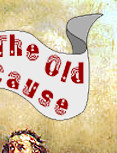THE
GOONS OF AUGUST
Around
the turn of the last century, or "fandy-sickle,"
as I call it here, there came forth from European and
American writers a mountain of militaristic balderdash
about the glories of war, the need to have one now and
then lest we lose our masculine virtues, and the like.
Not all of it was written by Theodore Roosevelt, but
he did his part.
Leaving
aside TR, my personal favorite – for years now – has
been J. A. Cramb, lecturer in history, Queen’s College,
London, whose little book, Germany and England,
published in mid-1914, oddly enough, is a sort of advertisement
for a coming Anglo-German war. Cramb stirred up alarm
about German intentions in Europe and the world, all
the while maintaining that good empires – Rome, Britain
– are much nicer than bad empires. That be as it may,
the book lives and breathes the spirit of armchair militarism,
with Cramb imagining in his concluding section "the
ancient, might deity of all the Teutonic kindred, throned
above the clouds, looking serenely down upon… his favorite
children, the English and the Germans, locked in a death-struggle,
smiling upon the heroism of that struggle, the heroism
of the children of Odin the War-god!"1
At least it shows that romanticism was alive, somewhere,
down to 1914.
This
sort of literature may have contributed to the lunatic
rush to enlist, the rather mindless super-patriotism
which cut across social classes, when the "guns
of August" began roaring in 1914. The world war
that western civilization got, 1914-1918, was probably
not quite what the pro-war drivel-writers actually had
in mind. They apparently dreamed of short little wars,
now and again, like the nice Franco-Prussian War. Of
course, getting what you want and wanting what you get
may not be the same thing. Jean (Ivan) Bloch wrote a
multi-volume study of modern war in the first years
of the 20th century to explain why, given
the existence of machine-guns, accurate rifles, and
barbed wire, any future general European war would be
extremely costly in men and materiel. Few in high places
read Bloch, and those who did, didn’t let him spoil
their pipe-dreams about short wars with heroic cavalry
charges. Oddly, Bloch thought that European governments
would not be stupid enough to keep a general war going
once they found out the costs. One doubts he ever dreamed
that the faraway Americans would be stupid to enough
to help Europe keep such a war going, once Europeans
proved stupid enough to do so.
THE
AMERICAN CONTRIBUTION
Theodore
Roszak, of counter-cultural fame, once hypothesized
that the timing of the pro-militarist literature suggests
it was a reaction to the first wave of feminism in western
societies. Whether this is true or not, there was a
lot of this writing and the French may have been the
worst, although you would never know it from those made-to-order
propaganda books of the two world wars, which emphasized
the German contribution to this awful genre. Across
the water, the United States was in the throes of what
Richard Hofstadter calls "the psychic crisis of
the nineties" when the pro-war writers got going.
This
psychic crisis grew out of the Panic of 1893 (an economic
depression which righted itself within a few years because
the government mostly left it alone), dangerous-looking
socialist movements led by immigrant radicals, dangerous-sounding
populist movements led by old-stock Americans who thought
the government was harming them (as indeed it was in
some ways), and some other social grievances. The cure
for all this was "the splendid little war"
of 1898, after which – having trounced the arrogant
Spanish feudalists – Americans were able "to feel
good about themselves," as the phrase goes, and
their elites were able to get on with the good work
of launching a neo-mercantilist economic empire.
I’VE
GOT TO ADMIT IT’S GETTING BETTER
Contrast
that – perhaps compare it – with out present happy state.
We do have some immigrant radicals (organized in characteristically
postmodern fashion around "ethnic" grievances)
and quite a lot of those native would-be populists,
but no depression, as yet. Anyway, depressions have
been redefined as "recessions," so as not
to diminish the glories of FDR’s New Deal, which made
further depressions impossible, by definition. Not to
worry, however, a depression can probably be arranged,
however unintentionally, by the very monetary authorities
who bask in the illusion of their "scientific"
ability to micro-manage whole economies.
What
seems different about this century-wending, as opposed
to the last, is the relative absence of any widely read
body of literature promoting militarism, cultural despair,
and general gloom-and-doom. Such works exist, of course,
but the dominant media and talking heads can’t get past
how great things are, how great they will continue to
be after more decades of US/NATO/UN/Starship-Enterprise
global oversight, how unsinkable the new unsinkable
economic order of "free-enterprise" neo-corporatism
and Open Door imperial "free trade" is, and
how utterly clever the new cyber technologies are. True
enough, as far as the last claim goes, but for the others,
maybe not.
I
am not asking for such a literature, by the way. It
is puzzling to me, however, that in 1899-1900, when
the civilization and culture of the west were in rather
better shape than they are now, so many took up doom-saying
and then, rather insanely, came up with militarism and
war as therapies. And why is it that now, when
a century of statism and war have actually brought about
a situation worth railing against, there is so little
intellectually serious gloom abroad in the land. The
late Murray
Rothbard always insisted that optimism is the only
proper long-run attitude, because markets work and states
don’t (or at least not in the usual sense of the word
"work"). This is true, but I think a little
gloom is sometimes in order to keep us aware of the
obstacles in the way of having free and prosperous societies.
THE
REAL ‘SUICIDE OF THE WEST’
James
Burnham,
ex-Trotskyite and contributing editor of National
Review, can be considered the first neo-conservative
– some twenty years ahead of his time. His Suicide
of the West (1964) is an interesting entry in
the decline-sweepstakes. It is a compendium of interesting
insights and debating points scored against liberal
opponents. Unfortunately, it rests on a full-bore commitment
to the high-holy cold war, which tends to reduce my
enjoyment of its good points. Back when some of us were
mutant teenage Goldwaterites, we thought it was a wonderful
book.
Burnham’s
critique of liberalism – if pulled out of its cold war
framework – is of much value. He remarked liberalism’s
endless striving to fix things, such that the good work
of reform is never done and "there is no point
at which the spirit can come to rest."2
Pity, as the rest of us want a break. He also noted
a generalized dislike or even hatred for western civilization.
We
have to distinguish between dislike for particular foreign
policies and dislike for one’s civilization, even if
Burnham did not. The great paradox is that in the post-cold
war world, many of the enemies of western civilization
look to the American empire, its satraps, and stooges
to bring about the heralded touchy-feely post-western
civilization of their dreams. As Paul Gottfried points
out, much of the global left loves the American
empire, which they expect will fulfill their (endless)
program, now the Soviet Union has failed them.3
Unhappily, they are not entirely wrong in this.
LATE
HELLENISTIC DESPAIR?
Here
may lie the real "decline of the west": in
the desire of so many western intellectuals to see our
civilized inheritance give way to just about anything
else that comes down the pike. If the American empire
wants to speed things up, why, that’s just fine. For
Spengler, comparable periods in different civilizations
– "late empire," for example – are in effect
"contemporaneous." In a fold-out chart at
the end of The
Decline of the West,
volume one, Spengler sets out "contemporaneous"
periods in the intellectual history of Indian, Classical,
Arabian, and Western civilization. The last two headings
are very interesting: Under "Degradation of abstract
thinking into professional lecture-room philosophy,"
Spengler equates Stoics and Epicureans with modern western
"logicians and psychologists." (I leave aside
his Indian and Arabian entries.) Under "Spread
of a final world-sentiment," he lists Buddhism,
Hellenistic-Roman Stoicism, "practical fatalism
in Islam after 1000 [A.D.]," and – for the west
– "Ethical Socialism from 1900."4
Now
this may be a matter of playing fast and loose with
the notion of corresponding or "contemporaneous"
periods, and may be, in the end, quite unfair to some
of the schools mentioned. Still, it may clarify a few
things, such as why Al
Gore turns up at Buddhist functions, for one. More
seriously, Spengler is not the last thinker to remark
certain similarities between our own period and Late
Hellenistic civilization, especially after Rome forcibly
imposed unity on that civilization.5
If
there is a decline of the west, it is in our very thought
and not such details as the loss of colonial
empires "we" should never had had and about
the existence of which so many post-colonial critical
theorists appear to be so upset. The present babbling
about the status of truth and the instability of language
seem perfect examples of a Late Hellenistic despair
quite fitting in our own period of late empire. Hugh
Nibley sees in the Late Hellenism of the Roman empire
"a fiercely arrogant insistence on stereotyped
uniformity and a quick suspicion of any hint of independence
or individuality" in a society which – "encouraged
by the state to avoid serious thinking" –
"worshipped its fighters, its actors, and its orators."6
If this seems at all familiar, it is not my fault. I
haven’t even brought up wrestlers. The comparative use
of history is not a hard science, but parallel trends
in civilizations can be enlightening.
References
[1]
J. A. Cramb, Germany and England (London: John
Murray, 1914), pp. 136-137.
[2] James Burnham, The
Suicide of the West (New Rochelle: Arlington
House, 1964), p. 204.
[3] Paul A. Gottfried, After
Liberalism: Mass Democracy in the Managerial State
(Princeton: Princeton University Press, 1999), p. 75
(and quoting John O’Sullivan).
[4] Oswald Spengler, The
Decline of the West, vol. 1 (New York: Alfred
A. Knopf, 1926) [no page].
[5] Cf. Edward McNall Burns, et al., World
Civilizations, 8th edition (New York:
W.W. Norton & Co., 1991), pp. 222-223.
[6] Hugh Nibley, "Victoriosa Loquacitas" in
The
Ancient State (Salt Lake City: Deseret Book
Co., 1991), pp. 263-264.
Please
Support Antiwar.com
A
contribution of $20 or more gets you a copy of Justin
Raimondo's Into the Bosnian Quagmire: The Case Against
U.S. Intervention in the Balkans, a 60-page booklet
packed with the kind of intellectual ammunition you
need to fight the lies being put out by this administration
and its allies in Congress. Send contributions to
Antiwar.com
520 S. Murphy Avenue, #202
Sunnyvale, CA 94086
or
Contribute Via our Secure Server
Credit Card Donation Form

|









